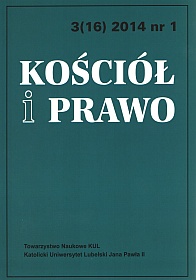Formation Human Candidates for the Priesthood in the “Principles of Priestly Formation in Poland” of 1999 and the Resolutions of the Second Polish Plenary Synod
Abstract
Ecclesiastical legislator committed conference of bishops in each country to develop a program of priestly formation. Polish Bishops Conference has issued standards that have been approved by the Congregation for Catholic Education in 1999. Issue of this document coincided with the end of the Second Polish Plenary Synod. His resolutions have some indications as to the formation in the seminary. These documents drew attention to the fact that the contemporary socio-cultural changes significantly influenced the appearance of gaps in the human formation of persons who want to become priests. The legislator stressed that the realization of humanity in this most important task seminarian seminary formation. It contributes to the personal development of the candidate, as well as in the long term, helps build relationships in pastoral work. Important elements of human formation seminarian is to achieve emotional maturity, mature form of freedom and the formation of responsible conscience. The introduction of the propaedeutical period and psychology to enable the candidate to the priesthood obtaining mature human formation. They are useful in even out difference and fill gaps in this sphere of formation.
References
Bagrowicz Jerzy., Radość bycia kapłanem – konsekrowanym dla zbawienia świata, Ateneum Kapłańskie 606 (2010), s. 215-230.
Balthazar Hans Urs, Gli stati di vita del cristiano, Milano 1985.
Baniak Józef, Istota i wartość egzystencjalna kapłaństwa hierarchicznego w interpretacji i ocenie młodzieży polskiej, Communio 1996, nr 3, s. 103-123.
Biskup Marian, Annus propedeuticus w formacji seminaryjnej – eksperyment czy konieczność?, Ateneum Kapłańskie 505 (1993), s. 470-474.
Borowski Andrzej, O wykształceniu humanistycznym duchownych, Ateneum Kapłańskie 537-538 (1998), s. 165-190.
Czerwik Stanisław, Osoby odpowiedzialne za formację kapłańską, Ateneum Kapłańskie 505 (1993), s. 427-441.
Fitych Tadeusz, Powołania kapłańskie w duszpasterskim posługiwaniu Kościoła, Ateneum Kapłańskie 504 (1993), s. 252-265.
Gałkowski Tomasz, Wiedza psychologiczna w formacji kandydatów do kapłaństwa, Prawo Kanoniczne 53 (2010), nr 1-2, s. 41-59.
Grün Anselm, Sumienie, życie, wolność, Pastores 4 (1999), nr 3, s. 5-18.
Jarosz Marek, Wartość i znaczenie badań psychologicznych w seminariach, Ateneum Kapłańskie 585 (2006), s. 273-287.
Kroplewski Zdzisław, Doświadczenie wolności i posłuszeństwa w semina-rium duchownym. Refleksja psychologiczna, Ateneum Kapłańskie 537-538 (1998), s. 191-209.
Mariański Janusz, Wolność jako wartość w procesie przemian. Refleksje socjologiczne, Ateneum Kapłańskie 537-538 (1998), s. 210-225.
May Rollo, Psychologia i dramat ludzki, Warszawa 1989.
Muszyński Henryk, Istotne wymiary formacji kapłańskiej, Ateneum Kap-łańskie 504 (1993), s. 238-251.
Pelc Andrzej, Powołanie do świętości w życiu kapłana, Communio 2003, nr 2, s. 35-59.
Potocki Andrzej, Religia w szkole wobec postaw młodzieży w obszarze moralności seksualnej i małżeńskiej, Ateneum Kapłańskie 628 (2013), s. 461-476.
Werbiński Ireneusz, Duchowość kapłana diecezjalnego, Ateneum Kapłań-skie 607 (2010), s. 440-449.
Werbiński Ireneusz, Formacja seminaryjna jako przygotowanie do życia kapłańskiego, Roczniki Teologiczne 28-29 (1991-1992), z. 5, s. 65-74.
Copyright (c) 2014 Kościół i Prawo

This work is licensed under a Creative Commons Attribution-NonCommercial-NoDerivatives 4.0 International License.





